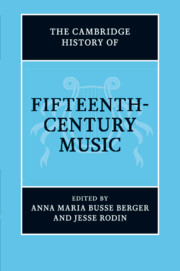Book contents
- The Cambridge History of Fifteenth-Century Music
- Series page
- The Cambridge History of Fifteenth-Century Music
- Copyright page
- Dedication
- Contents
- Figures
- Music examples
- Notes on contributors
- Acknowledgments
- Abbreviations
- Introduction
- Part I Historiography
- Part II Improvisation and composition
- 8 Oral composition in fifteenth-century music
- 9 Improvisation as concept and musical practice in the fifteenth century
- 10 How did Oswald von Wolkenstein make his contrafacta?
- 11 Making a motet: Josquin’sAve Maria … virgo serena
- 12 The origins of pervasive imitation
- Part III Humanism
- Part IV Music and other arts
- Part V Music in churches, courts, and cities
- Part VI Religious devotion and liturgy
- Part VII Theory and practice
- Part VIII Sources
- Part IX Genres
- Part X Reception
- Index
9 - Improvisation as concept and musical practice in the fifteenth century
from Part II - Improvisation and composition
Published online by Cambridge University Press: 05 July 2015
- The Cambridge History of Fifteenth-Century Music
- Series page
- The Cambridge History of Fifteenth-Century Music
- Copyright page
- Dedication
- Contents
- Figures
- Music examples
- Notes on contributors
- Acknowledgments
- Abbreviations
- Introduction
- Part I Historiography
- Part II Improvisation and composition
- 8 Oral composition in fifteenth-century music
- 9 Improvisation as concept and musical practice in the fifteenth century
- 10 How did Oswald von Wolkenstein make his contrafacta?
- 11 Making a motet: Josquin’sAve Maria … virgo serena
- 12 The origins of pervasive imitation
- Part III Humanism
- Part IV Music and other arts
- Part V Music in churches, courts, and cities
- Part VI Religious devotion and liturgy
- Part VII Theory and practice
- Part VIII Sources
- Part IX Genres
- Part X Reception
- Index
Summary
- Type
- Chapter
- Information
- The Cambridge History of Fifteenth-Century Music , pp. 149 - 163Publisher: Cambridge University PressPrint publication year: 2015
- 4
- Cited by

